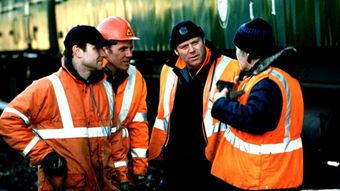The Navigators
Ken Loach

© Diaphana
Sheffield in the 1990s. The British government is privatising the national rail network.Paul and his wife have split up and he is staying with his friend Mick, a railwayworker like himself. The two of them are part of a maintenance and signalling teamwho discover the sometimes absurd rules imposed by the new management. Theworkers make fun of the entrepreneurial spirit vaunted by their superiors, but theysoon discover that they have to comply without question, or take redundancypayment and give up their jobs. Mick and Paul decide to stay. They are supported byGerry, the union shop steward.
With : Dean Andrews, Thomas Craig, Joe Duttine, Steve Huison, Venn Tracey
Screenplay : Rob Dawber
Image : Barry Ackroyd, Mike Eley
Editing : Jonathan Morris
Music : George Fenton
Screenplay : Rob Dawber
Image : Barry Ackroyd, Mike Eley
Editing : Jonathan Morris
Music : George Fenton
Production : Alta Films, Parallax Pictures, Road Movies Filmproduktion
Distribution: Diaphana
Distribution: Diaphana
“This is first and foremost an interventionist film, in direct contact with current events; in this case, the privatisation of the national railway company, British Rail, whose absurd and cruel consequences are pinpointed with great relevance by Loach, assisted by a new scriptwriter, Rob Dawber, who knows the issue from having worked for British Rail for eighteen years. This budding scriptwriter treads lightly in terms of manipulating the audience. For once, there isn't even a single, central character to identify with, no Christ-like hero burdened with all the woes of the world. Loach takes as his model a group of “navigators”, railway workers who maintain the tracks at the risk of their lives (we are startled when an executive mentions an “acceptable” death quota). Clearly truculent, but without exaggeration, these railwaymen bear the full brunt of the free-market law which, by privatising the company, is forcing them to work as temporary workers under disastrous safety conditions. The narrative is divided between these complex and well-documented socio-professional problems, the camaraderie of the workers and their relations with the management, based on insolence and facetiousness. The private lives of the characters enliven the narrative in a sparing and restrained way. This time, Loach has perfectly put his finger on it, throwing a beautiful stone into the pond of liberalism.” (Vincent Ostria; Les Inrockuptibles)
